Game studio challenges industry status quo with equal pay, no bosses

Image: Facebook/@dead.cells.game
A French video game studio challenged the status quo on running a gaming company by giving employees equal pay and doing away with bosses.
The indie game company started out in 2001 and made its mark on the video game industry with numerous free-to-play titles, particularly the social game platform “Twinoid,” which now has a community of 15 million registered users. Motion Twin recently gained more attention through its upcoming title “Dead Cells.” The game launched in 2017 as a paid early access title on Windows, macOS and Linux. It will later get a full release on Aug. 7 with ports for the Nintendo Switch, PlayStation 4 and Xbox One. So far the early access version of “Dead Cells” has sold over 700,000 units.
What makes Motion Twin function are the 11 members of what the company referred to as an “anarcho-syndical workers cooperative.” The system works by giving all 11 workers equal pay and equal voice in company meetings, according to a Kotaku report.
Any topic pertaining to projects, from small-scale discussions to strategic company matters, need to be decided in consensus. Smaller meetings could be held informally via Slack or the nearest coffee machine, while more serious topics require the say of everyone in the team. In case a consensus can’t be reached, decision making falls to a vote.
With 11 people able to put forward their own opinions, there will be times when not all ideas are agreed upon. In these cases, the company developed a culture of simply accepting rejections as the way things are.
Longtime Motion Twin game designer Sébastien Bénard said one of the challenges of this communal system is “to accept that sometimes, you’ll be right and your proposals will be chosen, and sometimes, your well-intentioned super revolutionary idea will be thrown away by the team. That’s the way it works, and everyone has to accept that the resulting decisions were made by people who understood your point of view, but decided to scrap it anyway.”
To manage people’s work hours, Motion Twin uses a strict time-tracking system so developers and artists only work at a set number of hours. This can sometimes lead to overlapping work times so they try to encourage people to work at the same time for better productivity.
“Years of experience told us it’s much more important to have people working together, at the same time, in the same place, than people working at home, or late at night alone in the office,” said Bernard in the report.
However, with each member of the team being essentially part owner of the company, pressure can mount up. Each employee would often monitor feeds, talk with gamers and do other activities to ensure a game is working as it should. This tendency leads to a kind of “burnout watch” culture among team members where they’ve learned to tell who is in need of a much-needed break. “It’s obviously better to lose a few work hours than a colleague,” said Bénard. “There’s absolutely no discussion about that.”
While Motion Twin’s system may sound like an ideal work environment, it does have its hiccups. Bénard imparted how some of their staff lost motivation when they attempted to grow the company to around more than 20 people. They eventually scaled back down to less than 15 people.
“Passionate workers can do much more in a few work hours than any dev forced to work on weekends or late at night,” said Bénard. “We were able to achieve much more being eight people than when we were 20+, so we plan to stay below the 15-person limit.”
Lastly, Motion Twin set their system as “a direct challenge, not just to the exploitative practices you see at a lot of other companies, but also to tired old world corporate structures in general.” Alfred Bayle /ra
RELATED STORIES:
‘Fortnite’ developers create memorial for player’s valiant rescue attempt
Neopets to make comeback with new mobile app
Tencent wins lawsuit against ‘Mobile Legends’ developers














